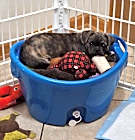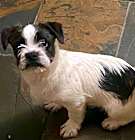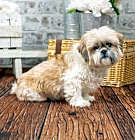Skye Terriers are small dogs, most weighing 35 to 45 pounds and standing 9 to 10 inches tall.
Skye Terrier
Breed Type: Terrier
Common nicknames: Skye
Coat: Double
Hypoallergenic: No, they will likely trigger allergies.
Temperament: Loyal, affectionate, friendly, playful
Life expectancy: 10-14 years
Color & patterns:

Originating from the Isle of Skye in Scotland, Skye Terriers were once treasured as loyal companions and trusted protectors of castles and estates. Today, with their long, flowing coats and expressive eyes, the Skye Terrier captures hearts wherever they go. Skye Terriers not only have a distinctive and elegant appearance but are also known for their intelligence and strong-willed nature, making them a challenging breed to train. Despite their independent streak, though, they form deep bonds with their families and are fiercely protective. So, if you’re looking for a faithful and eye-catching companion, the Skye Terrier could be the pup for you.
Skye Terrier characteristics
Learn about about Skye Terrier basics like their fur colors, shedding levels, how much grooming they need, and other Skye Terrier facts.
Average height
9-11 inches (22.9-27.9cm)
Average weight
19-42 pounds (8.6-19.1 kg)
Average lifespan
10-14 years
Exercise needs
Grooming needs
Full-grown size
Good with cats
Good with kids
Training Aptitude
What colors do Skye Terriers come in?
Skye Terriers come in a variety of colors, including black, blue, cream, fawn, gray, platinum, and silver.
Do Skye Terriers shed?
No, Skye Terriers don’t shed much. They are low and minimal shedding dogs.
When do Skye Terriers stop growing?
Skye Terriers stop growing between 12 to 18 months of age. They will continue to fill out and gain muscle mass until they are about two years old. Regular exercise and a balanced diet will encourage healthy growth during their early development.
Skye Terrier history
Learn about where this Skye Terrier came from!
Which breeds mix with Skye Terriers?
Some common breeds that mix with Skye Terriers include:
Skypoo (Skye Terrier + Poodle)
Scottish-Skye Terrier (Skye Terrier + Scottish Terrier)
Where are Skye Terriers from?
Skye Terriers are from the Scottish Isle of Skye, an island in the Hebrides archipelago off the west coast of Scotland. Bred for hunting, these dogs were prized for their ability to track and catch foxes, rats, and otters in the island’s rugged terrain, where their long, flowing coats protected them from harsh weather conditions. Though hardy, the Skye Terrier is elegant enough to have been a favorite of English and Scottish royalty, including Queen Victoria.
How many types of Skye Terriers are there?
There is one type of Skye Terrier. Though there are two variants in ear type (batwing or drop-ears) in the breed, dogs with either trait are still the same breed.
How long do Skye Terriers live?
Skye Terriers live 12 to 14 years. Individual lifespans will vary based on genetics, overall health, diet, exercise, and quality of veterinary care.
Skye Terrier temperament
Learn about about the Skye Terrier temperament and how well they fit into your lifestyle, home environment, and family.
Do Skye Terriers bark a lot?
Skye Terriers bark a moderate amount. Like most terriers, Skye Terriers are quite fond of their own voice. As with any dog, however, they can be discouraged from barking as frequently with proper training and exercise.
Are Skye Terriers good family dogs?
Yes, Skye Terriers are good family dogs. Their calm, affectionate temperament is a great fit for families charmed by a big personality in a small, elegant package. The Skye Terrier is more even-tempered in nature than other terriers.
Are Skye Terriers easy to train?
Skye Terriers aren’t as easy to train as some breeds, given their independence and stubborn streak. However, keep in mind that training any dog takes substantial time and effort, regardless of breed.
Early and consistent training is essential for this breed, and positive reinforcement will be one of a trainer’s best tools. This breed is sensitive to harsh correction.
Are Skye Terriers smart?
Yes, Skye Terriers are smart. These clever pups learn commands and tricks easily, especially with positive reinforcement.
Are Skye Terriers cuddly?
Yes, Skye Terriers are super cuddly. These loving dogs will happily sit on laps and adore close, physical affection. They enjoy spending time with their families and will seek out attention and companionship when you’re lying on the couch or reading in bed.
Are Skye Terriers good with cats?
No, Skye Terriers aren’t the best with cats. Because they were bred to chase small, furry things, Skye Terriers will likely be hot on the heels of a feline roommate.
Are Skye Terriers good with kids?
Skye Terriers are good with older kids but may fare less well with young children. Like most terriers, the Skye Terrier can be sensitive about their personal space, not something all children understand. For children who know how to handle a dog, though, these pups are loyal and affectionate.
As with any breed, supervise interactions between your child and Skye Terrier to keep everyone safe and happy. Teaching children how to properly approach and handle dogs is crucial to ensure positive experiences for both the dog and the child, as is teaching dogs how to interact gently with children.
Are Skye Terriers good with other dogs?
Yes, Skye Terriers are good with other dogs, particularly if they are socialized from a young age. Their friendly and playful dispositions smooth the way for positive interactions at the dog park and in multi-dog households.
Skye Terrier health
Learn about about the Skye Terrier health outlook and what diseases they may be prone to at various stages of their life.
Are Skye Terriers healthy?
The Skye Terrier is a hardy little breed with a long average lifespan. However, they are susceptible to back issues due to their long-backed and short-legged structure.
Are Skye Terriers hypoallergenic?
No, Skye Terriers are not hypoallergenic. While their wiry coat sheds less than other breeds, they can still trigger allergies in sensitive individuals. If allergies are a concern for you or someone else in your household, spend time with a Skye Terrier before bringing one home for good.
What are the health issues with Skye Terriers?
Some common health issues that Sky Terriers may experience include:
Hip and/or elbow dysplasia: Hip and elbow dysplasia are two of the most common skeletal diseases seen in dogs. They are similar diseases in which either the hip or elbow joint has grown abnormally or is misshapen. The abnormal shape prevents the joints and sockets from adequately meeting one another, resulting in rubbing and grinding instead of sliding smoothly. Though the main complication with hip dysplasia is joint instability, the abnormalities present in elbow dysplasia often result in pieces of bone and/or cartilage breaking loose and irritating the joint tissues. Over time, the rubbing from dysplasia can cause a variety of issues, such as pain, lameness, and secondary osteoarthritis. Surgery can fix the joint if diagnosed before the onset of arthritis. If you are rescuing a Skye Terrier, have them checked out by a vet to see if they are prone to dysplasia.
Degenerative disc disease: Degenerative disc disease causes a bulge or rupture in the discs between the vertebrae. The discs are responsible for protecting the spine and allowing flexible movement. When a disc bulges or ruptures, it can cause pain, nerve damage, and paralysis. About 10% of Skye Terriers have degenerative disc disease.
Sky limp: Young Skye puppies may develop a limp as a result of the growth plates in their leg bones closing too early. It is not a painful condition, but pet parents must be careful of this breed jumping from heights and engaging in too much physical activity in the first year of their life to prevent bone damage.
Hypothyroidism: This thyroid malfunction results in low hormone production and could cause obesity, low energy, and a brittle coat.
Mammary (breast) cancer: This is the leading cause of death in Skye Terriers.
Autoimmune diseases: This includes a group of diseases that occur when the body’s immune system attacks healthy cells.
A veterinarian may recommend joint imaging and DNA tests for your dog to identify some of these issues.
Do you need to groom a Skye Terrier?
Yes, you need to groom a Skye Terrier. (You wouldn’t expect less from a royal breed!) Their long, luxurious coat requires weekly brushing to keep it from tangling and matting.
Popular Skye Terrier mixes
Some common breeds that mix with Skye Terriers include:
Skypoo (Skye Terrier + Poodle)
Scottish-Skye Terrier (Skye Terrier + Scottish Terrier)

Find Skye Terrier puppies near you
Adopting a Skye Terrier
We don't see any Skye Terriers available for adoption in your exact location or cities near you, but here are some adorable similar breeds in Columbus, OH.

Barry
Shih Tzu Bichon Frise
Male, 5 yrs 9 mos
Westerville, OH
Not good with dogs
Not good with cats

Joan (Joan and Sylvia)
Shih Tzu
Female, 5 yrs 3 mos
Lewis Center, OH
Not good with dogs
Not good with cats

Sylvia (Joan and Sylvia)
Shih Tzu Pug
Female, 5 mos
Lewis Center, OH
Not good with dogs
Not good with cats

ISSAC
Shih Tzu Cairn Terrier
Male, 3 mos
Columbus, OH
Good with dogs
Good with cats
House-trained
Shots are up-to-date

Timmy - NDMR TN
Lhasa Apso
Male, young
Pataskala, OH
Good with dogs
Not good with cats
Spayed or Neutered
Shots are up-to-date

Freddie -OS
Shih Tzu
Male, adult
Pataskala, OH
Good with dogs
Not good with cats
Needs special attention
Spayed or Neutered
Shots are up-to-date

Hayes - ARR
Shih Tzu
Male, young
Pataskala, OH
Good with dogs
Not good with cats
Spayed or Neutered
Shots are up-to-date

Milo - OS
Shih Tzu
Male, puppy
Pataskala, OH
Good with dogs
Not good with cats
Spayed or Neutered
Shots are up-to-date

Barry
Shih Tzu Bichon Frise
Male, 5 yrs 9 mos
Westerville, OH
Not good with dogs
Not good with cats

Joan (Joan and Sylvia)
Shih Tzu
Female, 5 yrs 3 mos
Lewis Center, OH
Not good with dogs
Not good with cats

Sylvia (Joan and Sylvia)
Shih Tzu Pug
Female, 5 mos
Lewis Center, OH
Not good with dogs
Not good with cats

ISSAC
Shih Tzu Cairn Terrier
Male, 3 mos
Columbus, OH
Good with dogs
Good with cats
House-trained
Shots are up-to-date

Timmy - NDMR TN
Lhasa Apso
Male, young
Pataskala, OH
Good with dogs
Not good with cats
Spayed or Neutered
Shots are up-to-date

Freddie -OS
Shih Tzu
Male, adult
Pataskala, OH
Good with dogs
Not good with cats
Needs special attention
Spayed or Neutered
Shots are up-to-date




